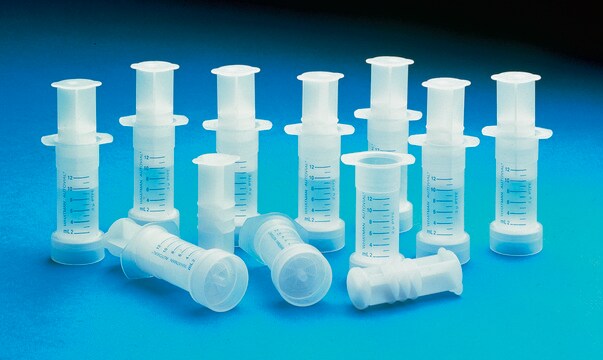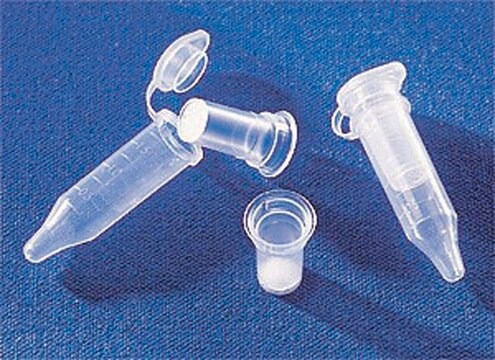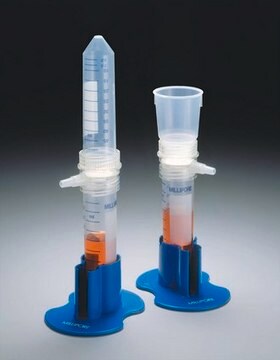WHAAV125EORG
Whatman® Autovials™ syringeless filters
autovial 12 syringeless filter, glass prefilter, PTFE, 0.2 μm, 50/pk
Sinónimos:
Z270792, filtration units
About This Item
Productos recomendados
Materiales
PTFE membrane
polypropylene housing
esterilidad
non-sterile
Características
autoclavable (121°C for 20 minutes)
cap: no
disposable
graduations
envase
pack of 50
fabricante / nombre comercial
Whatman AV125EORG
Whatman Article No. 28421433 (US reference)
capacidad
12 mL
filtro área
3.0 cm2
tamaño
tamaño de poro
0.2 μm
Adaptador
male outlet (Slip-tip)
¿Está buscando productos similares? Visita Guía de comparación de productos
Categorías relacionadas
Descripción general
Autovial syringeless filters are preassembled filtration devices for removing particulates from samples. They replace syringe-coupled filtration devices with single, disposable units.
Autovial devices are comprised of two parts: a graduated filter barrel and a plunger. The proven design features an integral filter, built-in air purge and a support stand that protects the recessed slip-luer tip. They are available in a 5 mL and 12 mL volume capacity.
The Autovial filter is selected according to membrane compatibility with the sample. In practice, the sample is poured into the 5 mL or 12 mL capacity filter barrel. The plunger is inserted into the barrel until the bottom is securely in place; there is a gap of air between the sample and plunger. Then, the tip of the Autovial is placed into the mouth of an autosampler vial or container and the plunger compressed. Filtration begins immediately and, as the plunger is compressed until it reaches the bottom, the membrane is purged with air for maximum sample recovery. For direct instrument injection, a needle is placed on the Autovial slip-luer outlet.
Aplicación
- Cellulose Acetate (CA): low nonspecific protein binding and high loading capacity membrane for biological solutions
- Glass microfiber (GMF): depth filter for samples in aqueous or organic solutions
- Nylon (NYL): for aqueous and organic samples within a pH range between of 3 to 10
- Polyethersulfone (PES): low non-specific protein binding membrane for samples in aqueous solutions
- Polypropylene (PP): Hydrophobic membrane. Resistant to a wide range of organic solvents
- Polytetrafluorethylene (PTFE): PTFE membrane for samples with > 50% organic solvent
- Polyvinylidene Fluoride (PVDF): low nonspecific protein binding membrane for samples in aqueous solutions and/or organic solvents
Características y beneficios
- Single unit convenience saves time. No assembly required - easier to load
- Choice of filter media. Compatible with a wide range of sample types
- Ideal for hazardous samples. Self contained device eliminates risk of filter pop-off
- Built-in air purge maximizes sample recovery
- Sterile option available to maintain sample integrity
- Unique prefilter design for difficult-to-filter samples (no prefilter in Autovial 5 and in selected Autovial 12)
- Choice of glass fiber or polypropylene prefilters
Otras notas
Información legal
Elija entre una de las versiones más recientes:
Certificados de análisis (COA)
Lo sentimos, en este momento no disponemos de COAs para este producto en línea.
Si necesita más asistencia, póngase en contacto con Atención al cliente
¿Ya tiene este producto?
Encuentre la documentación para los productos que ha comprado recientemente en la Biblioteca de documentos.
Nuestro equipo de científicos tiene experiencia en todas las áreas de investigación: Ciencias de la vida, Ciencia de los materiales, Síntesis química, Cromatografía, Analítica y muchas otras.
Póngase en contacto con el Servicio técnico


